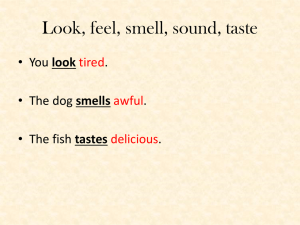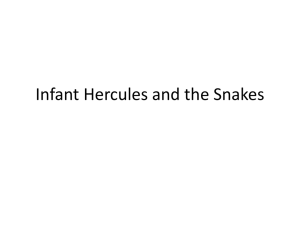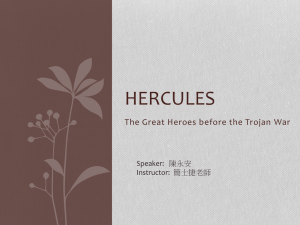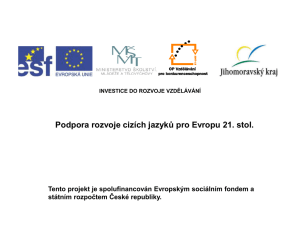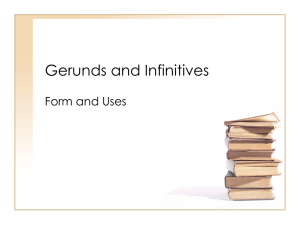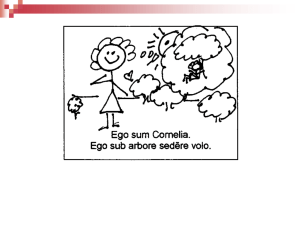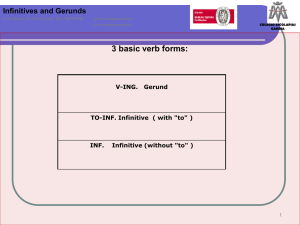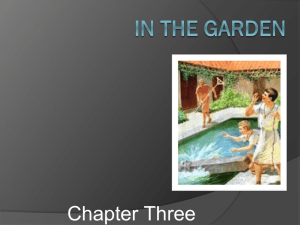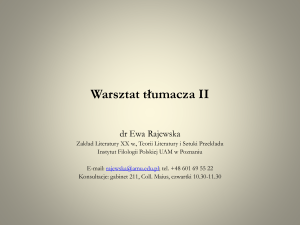FABULA - Weebly
advertisement
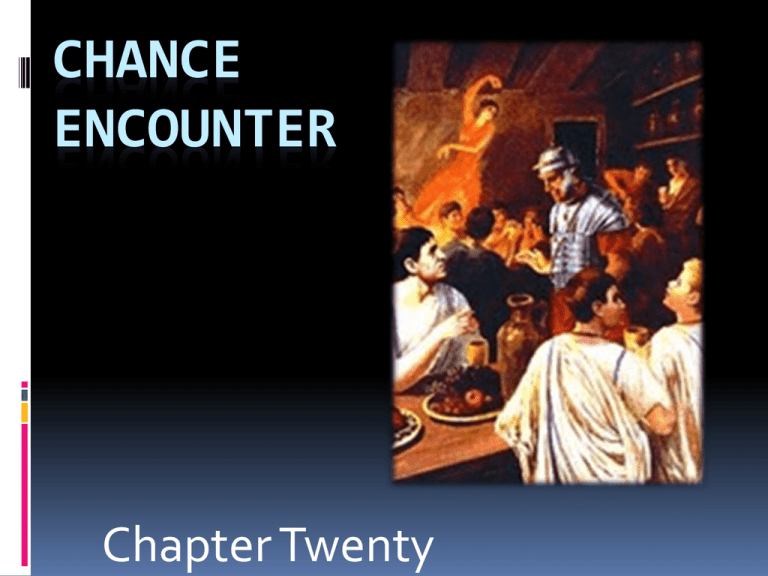
CHANCE ENCOUNTER Chapter Twenty VOCABULARIA VOCABULARIA VOCABULARIA VOCABULARIA VOCABULARIA VOCABULARIA VOCABULARIA VOCABULARIA VOCABULARIA VOCABULARIA VOCABULARIA VOCABULARIA VOCABULARIA VOCABULARIA VOCABULARIA VOCABULARIA VOCABULARIA VOCABULARIA VOCABULARIA VOCABULARIA VOCABULARIA Vocab List Verbs Adverbs maneo, manere, mansi, mansus-to remain paulisper-for a short time mitto, mittere, misi, missus-to send numquam-never volo, velle, volui-to want, wish antea-before dico, dicere, dixi, dictus-to say Preposition post-after In hanc cauponam-into this inn neco, necare, necavi, necatus-to kill narro, narrare, narravi, narratus-to tell Adjectives narratus, -a, -um-told Conjunction medius, -a, -um-middle enim-for optimus, -a, -um-best Noun Phrase media nox-midnight Dum…devorant-While…were devouring Vir optime-sir Nouns fabula, -ae, f.-story miles, militis, m.-soldier Interrogative Licetne nobis…? Is it allowed for us…? Cur non…istis? Why didn’t you go? Imperative Esto! All right! Workbook Activity 20G To what Latin word are all of the following English words related?______________ 1. Dictate A. B. 2. Dictionary 3. Predict 4. Edict 5. Indict Etymology MEDIUS MILES OPTIMUS FABULA NARRATUS 1. The ______________ of the story was difficult. 2. Our ______________forces won a great victory in battle. 3. An ______________ person always looks on the bright side. 4. The ______________ divided the highway. 5. The book of Aesop’s ______________ teaches lessons with morals to help children develop strong character. Constructing Derivatives 1. Postpone 2. Post-Secondary 3. Postnatal 4. Postorbital 5. Postprandial 6. Post mortem 7. Post partum 8. Postscript 9. Posthumous Chance Encounter: Lines 1-11 Ubi Cornelia et mater cubitum ierunt, Marcus et Sextus cum Cornelio manserunt. Cum Cornelio cenare et post cenam ad mediam noctem vigilare in animo FABULA habuerunt, nam omnia videre et omnia audire voluerunt. Marcus, “Esurio, pater,” inquit. “Esurisne tu quoque, Sexte?” “Ita vero!” respondit Sextus. “Semper esuritis, tu et Marcus!” FABULA exclamavit Cornelius. “Licetne nobis,” inquit Marcus, “hic cenare?” Paulisper tacebat pater, sed tandem, “Esto!” inquit. “Tibi et Sexto licet hic cenare. Post cenam tamen necesse est statim cubitum ire.” Riserunt pueri quod laeti erant. FABULA “Gaudemus, pater,” inquit Marcus, “quod nos in cubiculum non statim misisti. Voluimus enim hic manere et alios viatores spectare.” Chance Encounter: Lines 12-25 Tum Cornelius cauponem iussit cibum parare. Brevi tempore servus cibum ad eos portavit. Dum pueri cibum devorant, subito intravit miles quidam. Cornelium attente spectavit. “Salve, vir optime!” inquit. “Salvete, FABULA pueri! Cur vos in hanc cauponam intravistis? Cur non ad villam hospitis istis? Nonne tu es senator Romanus?” “Senator Romanus sum,” respondit Cornelius. “Nos in hanc cauponam intravimus quod raeda nostra in fossa haeret immobilis. In agris nocte manere nolebamus, sed numquam antea in caupona pernoctavimus. FABULA Certe in agris pernoctare est periculosum.” Tum miles, “Etiam in caupona pernoctavimus. Certe in agris pernoctare est periculosum.” “Cur hoc nobis dicis?” rogavit Cornelius. “Estne hic caupo homo scelestus? De FABULA Apollodoro quid audivisti?” “De Apollodoro nihil audivi, sed semper est periculosum in caupona pernoctare. Vosne audivistis illam fabulam de caupone narratam? Ille caupo hospitem necavit.” “Minime!” inquit Cornelius. “Illam FABULA fabulam non audivi. Cur igitur nobis illam non narras dum cenamus?” Forms: Consolidation of Perfect Tense Most common verb tense SINGLE COMPLETED ACT Formation: 3rd PP - final i + perfect tense personal endings PERSON SINGULAR PLURAL 1st -i -imus 2nd -isti -istis 3rd -it -erunt portavi portavimus portavisti portavistis portavit portaverunt timui timuimus timuisti timuistis timuit timuerunt dixi diximus dixisti dixistis dixit dixerunt fui fuimus fuisti fuistis fuit fuerunt veni venimus venisti venustis venit venerunt Workbook Activity 20A: Fill In 1. PRESENT mittis 2. IMPERFECT mittebas tenebant 3. 4. audivimus peto 5. habebatis 6. gemis 7. est 8. iaciebam 9. 10 . PERFECT misisti intravimus iubebant Practicing Perfect custodio habeo neco specto 1st Sing 2nd Sing 3rd Sing 1st Pl 2nd Pl 3rd Pl appareo 1st Sing 2nd Sing 3rd Sing 1st Pl 2nd Pl 3rd Pl devoro terreo dormio Translate 1. spectavimus 6. misimus 11. haesi 2. gemuerunt 7. discessistis 12. iussimus 3. necavi 8. dormivit 13. necavistis 4. erravit 9. petiverunt 14. erraverunt 5. tenuisti 10. intravisti 15. discessit Change from perfect to imperfect 1. spectavimus 6. misimus 11. haesi 2. gemuerunt 7. discessistis 12. iussimus 3. necavi 8. dormivit 13. necavistis 4. erravit 9. petiverunt 14. erraverunt 5. tenuisti 10. intravisti 15. discessit Change from perfect to present 1. spectavimus 6. misimus 11. haesi 2. gemuerunt 7. discessistis 12. iussimus 3. necavi 8. dormivit 13. necavistis 4. erravit 9. petiverunt 14. erraverunt 5. tenuisti 10. intravisti 15. discessit Give the Latin for: 1. I told 6. She guarded 11. They spoke 2. He saw 7. He groaned 12. She prepared 3. We ran 8. They killed 13. You all had 4. They walked 5. You slept 9. We sent 10. I led 14. They did 15. He threw Book Activity 20B 1. Ego libero in horto petiv________; tu eos in silva inven________. 2. Ubi tunica Sexti in ramis haerebat, nos omnes ris________. 3. Quo iit Cornelia? Ego et Marcus patrem hoc rogav________, sed ille nihil respond________. 4. Quamquam Sextus fuit molestus, servi eum non verberv________. 5. Ubi heri fu________, Marce et Cornelia? Pater et mater nos iuss________ hic manere. 6. Postquam vos cenav________, cubitum ire volu________. 7. Heri nos in urbe eramus, sed matrem ibi non vid________. 8. “Unde ven________, amici?” rogav________ caupo. “Quo nunc itis?” 9. Tune Cornelium vid________, ubi tu Romam adven________? Ego certe eum non vid________. 10. Ille, postquam haec audiv________, e caupona se praecipitav________. Building the Meaning Subordinate Clauses with the Conjunction dum Examples with subordinate clauses introduced by the conjunction dum: Dum Cornelii cenant, miles fabulam narrat.Sub & Main Clauses=Present Tense While the Cornelii eat dinner, the soldier tells a story. Dum Cornelii cenabant, miles fabulam narrabat. Sub & Main Clauses=Imperfect Tense While the Cornelii were eating dinner, the soldier was telling a story. Actions are taking place at the same time, or over the same period of time in the past. Dum pueri cibum devorant, subito intravit miles quidam. While the boys were devouring their food, a certain soldier suddenly entered. Now the verb in the subordinate clause is in present tense, and the verb of the main clause is in the perfect tense. The subordinate clause describes an action that was continuing over a period of time in the past when SUDDENLY a single, simple action occurred. Latin uses the present tense in clauses starting with dum when the main clause is in the perfect tense. Translate as while…were verbing… Building the Meaning Uses of the Infinitive The infinitive is a form of the verb without person or number, giving its basic meaning. The present infinitive form gives you the PRESENT STEM and enables you to identify the CONJUGATION of the verb. (1st-are, 2nd-ēre, 3rd-ere, 4th-ire) A. COMPLEMENTARY INFINITIVES: Verbs which imply ANOTHER ACTION OF THE SAME SUBJECT to complete their meaning take the infinitive. Examples: Marcus arbores ascendere non vult. Marcus does not want to climb trees. Multi viatores ad meam cauponam venire solent. Many travelers are accustomed to come to my inn. B. INFINITIVE WITH IMPERSONALS: Necesse est and licet are said to be impersonal because the subject IT is supplied. The infinitives are actually the grammatical subjects. Examples: Nobis necesse est statim discedere. It is necessary for us to leave immediately. Vobis licet hic cenare. It is permitted for you to dine here. C. INFINITIVE AS SUBJECT OF THE VERB EST: Infinitive is used as a verbal noun and it neuter in gender. Examples: Certe in agris pernoctare est periculosum. To spend the night in the fields is certainly dangerous. D. ACCUSATIVE AND INFINITIVE WITH VERBS LIKE DOCERE AND IUBERE: Examples: Aurelia Corneliam docet villam curare. Aurelia teaches Cornelia (how) to take care of the country house. Ancillam iubet alias tunicas et stolas et pallas in cistam ponere. She orders a slave-woman to put other tunics and stolas and pallas into a chest. Book Activity 20C Line # 1 2 3 4 5 6 7 8 9 10 11 12 13 14 Infinitive Use Book Activity 20D TRANSLATION 1. Cur, Marce et Sexte, ad mediam noctem vigilare in animo habetis? 2. Omnia videre et audire volumes quod numquam antea in caupona pernoctavimus. 3. Dum pueri in caupona erant, dormire nolebant. 4. Cur voluisti hic pernoctare, Marce? 5. Cur in caupona pernoctavistis, pueri? Licetne filio senatoris in cauponam intrare? 6. Cornelius servum in cubiculum ire iussit. 7. In via percontare periculosum est. 8. Dum Cornelius et pueri cenant, intravit miles quidam. 9. Vobis in caupona cenare licet. 10. Ego et tu cubitum ire noluimus. EXPLANATION Workbook Activity 20C 1. Flavia et Cornelia cubitum iverunt, sed Marcus et Sextus cum Cornelio ___________________. (stayed) 2. Ad mediam noctem ___________________ in animo habuerunt.(to stay awake) 3. Marcus et Sextus esuriunt et Marcus rogat, “___________________ ___________________ hic cenare?” (May we) 4. ___________________ tacebat pater. (For a short time) 5. Tandem, “___________________!” inquit. (“All right!”) 6. Riserunt pueri quod laeti erant. Voluerunt ___________________ ibi cenare et alios viatores spectare. (for) 7. Dum pueri cibum ___________________, subito intravit ___________________ ___________________. (devour) (a certain soldier) 8. “Salve, ___________________ ___________________,” inquit. (sir) 9. “Cur vos ___________________ ___________________ ___________________ intravistis?” (into this inn) 10. “Quod raeda nostra in fossa ___________________ ___________________,” respondet Cornelius. (is stuck fast) Recycling Bin CASE cenam (2) pater (8) pueri (10) viatores (11) tempore (12) hospitis (15) fossa (17) agris (17) cauponem (23) hospitem (23) NUMBER Roman Hospitality http://dsc.discovery.com/news/briefs/200411 29/romanreststop.html http://visitingtheancients.com/blog/2010/07/a ncient-roman-restaurants-taverns-and-inns/ Building the Meaning Principal Parts AMO: 1st person singular, present tense=I love, I am loving, I do love AMARE: present infinitive=to love, to be loving AMAVI: 1st person singular, perfect tense=I loved, I did love, I have loved AMATUS, A, UM: perfect passive participle (verbal adjective)=having been loved, loved Present Infinitive Perfect 1st Conj. 2nd Conj. 3rd Conj. -io 4th Conj. amo habeo mitto iacio audio amare habēre mittere iacere audire Perfect Meaning Passive of the Verb Participle amavi amatus To love habui habitus To have misi missus To send ieci iactus To throw audivi auditus To hear Workbook Activity 20B 1st Sing. Present 1 2 3 4 5 6 7 8 9 10 11 12 13 14 15 16 17 18 19 20 21 22 23 24 Rides, risisti Faciunt, fecerunt Cadimus, cecidimus Statis, stetistis Venis, venisti Dicunt, dixerunt Concidimus, concidimus Fugiunt, fugerunt Ascendit, ascendit Ponitis, posuistis Vides, vidisti Extrahit, extraxit Movent, moverunt Tradunt, tradiderunt Surgis, surrexisti Scribis, scripsisti Deverto, deverti Excipiunt, exceperunt Adiuvas, adiuvisti Sedet, sedit Conspicio, conspexi Legunt, legerunt Gerit, gessit Reprehendunt, reprehenderunt 25 26 27 28 29 30 31 32 Quiescent, quieverunt Consulimus, consuluimus Currit, cucurrit Respondes, respondisti Repellitis, reppulistis Arripiunt, arripuerunt Agimus, egimus Estis, fuistis Present Infinitive 1st Sing. Perfect History: The Early Republic After the monarchy: Lucius Junius Brutus and Lucius Tarquinius Collatinus-First Consuls of new republic Rome expanded physically through military conquests to all of Italy south of the Rubicon River Political growth Adaptation of the constitution Not formal-set of practices and policies The Consuls and the Magistrates Consuls Two leaders elected to a 1 year term Leaders of the civil government and generals of the Roman army Assured that no one person could have unlimited power Other officers named to assist consuls Elected annually Two or more individuals with same title and shared duties Praetors: directed judicial system Aediles: supervised commerce and public works Tribunes: championed lower classes Quaestors: handeled financial matters As Rome increased, number of people holding offices increased Censors: chosen every 5 years to revise list of Senate and carry out census to assign citizens to classes Dictator: position appointed in times of emergency for a 6 month period Cincinnatus Cursus Honorum: Political Ladder Election as quaestor, appointment to Senate, praetor, consul, and censor; may become aedile after quaestor before becoming a praetor Comitia centuriata: Centuriate assembly Originated in the army Passed laws, ratified treaties, issued declarations of war, elected consuls, praetors, aediles, censors, and priests of religion Citizen assigned to voting block in assembly by wealth Equites-made up the 18 richest of 193 centuries Next richest were 80 centuries of infantry or foot soldiers Bottom ranking were citizens with no land in one century Each century had one vote Comitia tributa: Tribal assembly Outgrowth of the Council of Plebians Issued plebicites which were like laws Elected aediles and tribunes who had power of veto on laws which were unjust to plebians Senate Advisory council of former magistrates Controlled finances and foreign policy Major influence The Citizen Army Needed to survive continual battles with neighboring states plebeians-provided man power and wanted equality as citizens Wealthy plebeians wanted equality with patricians Forced changes Organized mass strikes and refused to perform their military service Leadership Tribunes Twelve Tables Legal practices which were codified and written on bronze tablets Guaranteed every Roman citizen the right to justice Tribal assembly became official to pass plebiscites and elect aediles and tribunes Right to hold office allowed plebians to become senators Fairly representative government Tribal assembly equal to laws passed by Centuriate assembly New ruling class of senatorial aristocracy of patricians and wealthy plebians The Conquest of Italy First victories Neighbors: Sabines, Aequi, and Volsci (mountains) Etruscans (across Tiber from north) Latins (south) 390: Gauls invaded Italy from the north, occupied all Rome except Capitoline Hill Rome led by Camillus and chased out invaders Standing army then formed-legions armed with spears and short swords, arranged in units or maniples Established camps with fixed plans and a growing network of roads New opponents Samnites and Greek cities in southern Italy Pyrrhus, king of the Greek nation of Epirus, invited to assist fellow Greeks Brought elephants to Italy, only won by losing a lot of men Pyrrhic victories at Heraclea in 280 and Ausculum in 279 “One more victory like this, and we shall be truly ruined.” Rome left master of Italy Rome formed alliances with cities they won Gave military allegiance and control of foreign policy Offered citizenship to many neighbors Mythology: Atlas Atlas was a second generation Titan. He personified the quality of endurance. His father was the Titan Iapetus and his mother was either Klymene or Asia. His children were The Pleiades, Calypso, Maera, Dione, and The Hesperides. Atlas led the Titans in a rebellion against Zeus and was punished by being condemned to bear the heavens upon his shoulders. He also instructed mankind in the art of astronomy. This was used by sailors for navigation, and by farmers to measure the seasons. These functions created Atlas as the god who turns heaven on its axis and causes the stars to revolve. Atlas and Hercules During the labors of Hercules, Prometheus advised Hercules not to go after the apples himself, but rather to relieve Atlas of the celestial sphere and dispatch him. So when Hercules reached Atlas, he remembered Prometheus’ advice and took over the sphere. Atlas picked three apples from the garden of the Hesperides, then returned to Hercules. Not wanting to hold up the sphere, he told Hercules that he should carry the applies back to Eurystheus, and that Hercules could hold up the sky in his place. Hercules agreed, but by a trick gave the sphere back to Atlas. On the advice of Prometheus, he asked Atlas to take the sky while he put a cushion on his head. Hearing this, Atlas set the apples down on the ground, and relieved Hercules of the sphere. Thus Hercules picked them up and left. Some say, however, that he did not take the apples from Atlas, but killed the Drakon that guarded them, and picked them himself. Some also say that he built two great pillars at the ends of the earth to help relieve the Titan of his burden. Returning with the apples he gave them to Eurystheus who made a present of them to Hercules. But Athena retrieved them from him and took them back, for it was not permitted by diving law to locate them anywhere else. How Atlas was turned to stone… From Ovid: “Now at dusk, fearing to trust the night, he [Perseus flying on winged sandals] landed on the far Hesperian shore, the realm of Atlas, seeking rest awhile . . . Atlas Iapetionides (son of Iapetos) surpassed all men in giant size. He ruled the world’s last lands and that far sea that greets the panting horses of the sun and welcomed their tired wheels. A thousand herds roamed on his pastures and a thousand flocks, unchecked, untroubled by a neighbour’s bounds; and there were trees whose glittering leaves of gold clothed golden apples under golden boughs. `Good friend’, Perseus addressed him, `if renown of lineage may count, I take my line from Juppiter [Zeus], my father; or if deeds can win your admiration, mine you will admire. I ask for rest and lodging.’ But the giant recalled the oracle which Themis Parnasia had given : `Atlas, a time shall come when from your tree the gold shall be despoiled, and of that spoil a son of Jove shall boast.’ In fear he had walled his orchards all around with massive ramparts and for guardian set an enormous Draco; and drove off all strangers from the borders of his realm. To Perseus too `Away! Begone!’ he cried, `Or you shall find no joy in that renown your lies invent, no joy in Juppiter [Zeus].’, and added force to threats, as Perseus tried fair words at first, then bravely grappled him. But when he found his strength surpassed (for who could match the strength of Atlas?) `Very well!’ he taunted, `If you rate my thanks so low, accept a gift!’ and turned his face away and on his left held out the loathsome head, Medusa’s head. Atlas, so huge, became a mountain; beard and hair were changed to forests, shoulders were cliffs, hands ridges; where his head had lately been, the soaring summit rose; his bones were turned to stone. Then each part grew beyond all measure (so the gods ordained) and on his shoulders rested the whole vault of heaven with all the innumerable stars."

